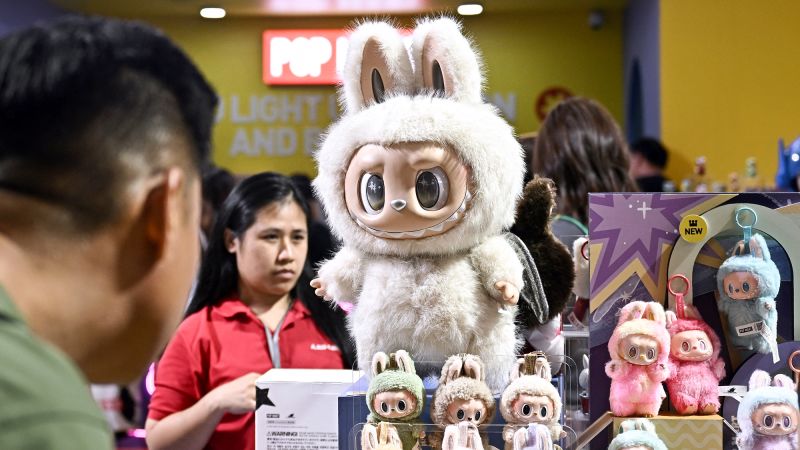Chinese customs officials recently showcased their latest haul to the media, but instead of seizing drugs or weapons, they revealed suitcases overflowing with plush toys. Among the confiscated items were numerous Pop Mart Labubus—charming yet quirky figures that have ignited global buying frenzies, sometimes even leading to brawls among eager fans waiting outside retail locations.
In China, the home of Pop Mart and the majority of its toy production, consumers have been struggling to find Labubus. CNN’s recent visit to a bustling Pop Mart shop in downtown Beijing found the dolls completely absent from the shelves, save for a few samples on display behind glass.
Evelyn Lin, a devoted fan of Pop Mart, shared her frustrations with CNN, stating, “Labubus are typically ‘sold out in seconds’ when released.” She lamented the difficulty of acquiring these coveted toys through official channels, remarking, “It’s almost impossible to get a Labubu via the official channels.”
As a result, many fans have resorted to unconventional means, including purchasing from smugglers. Since April, Chinese customs have confiscated a total of 462 Pop Mart toys, according to a CNN review of various official announcements. One particular seizure showcased by the Customs Administration revealed that the toys were confiscated because they were intended “for profit by resale,” though it remains unclear if any smugglers will face additional legal repercussions.
Labubu, conceived by Hong Kong designer Kasing Lung, has steadily garnered a loyal following since its introduction in 2015. However, its popularity has surged dramatically in recent months, with celebrities like Rihanna, Dua Lipa, and Lisa from K-pop group Blackpink sporting the creatures as good luck charms. The toys even made an appearance at Paris Fashion Week earlier this year.
Reports from Chinese state media, including Cover News, indicate that a blind box from the latest Labubu 3.0 series, which originally retails for 584 yuan (approximately $81), is now being resold for prices ranging from 1,000 yuan ($139) to 2,000 yuan ($278) in the secondary market.
Pop Mart’s financial results highlight the booming demand for Labubus, showing that the company’s global gross profit increased by over 125% last year, with revenue in mainland China exceeding $1.09 billion—a 34% rise compared to 2023.
However, purchasing from resellers comes with its own set of risks. Kate Yang, a Labubu enthusiast from Beijing, recounted her own troubling experiences, stating that her last two acquisitions from resellers turned out to be counterfeit. “Because they are not available on official platforms, if you’re in a rush to get a gift for a friend, you just can’t manage to get the popular ones in time,” Yang explained. “You can only pay extra to buy from resale platforms.”
CNN’s Marc Stewart and Martha Zhou contributed reporting.
